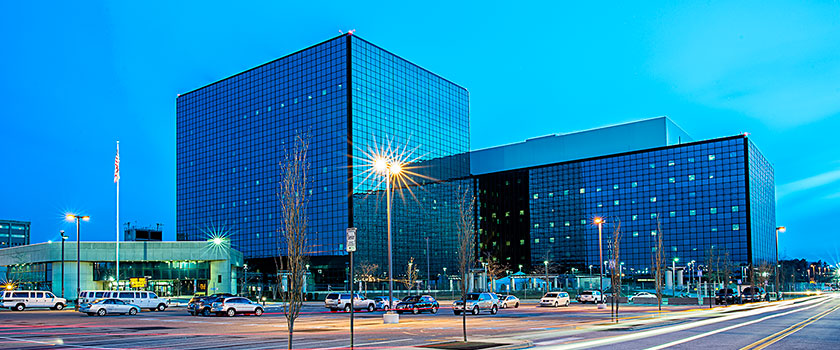
Insights from Rebecca J. Richards, Director, NSA Office of Civil Liberties and Privacy
Rebecca "Becky" Richards has one of the National Security Agency's most important jobs: to ensure that the privacy rights and civil liberties of U.S. persons - a category that includes citizens, green card holders, and U.S.-incorporated companies - are taken into account in all of NSA's activities.
At NSA, Richards has a seat at the table and an influential voice. She is passionate about NSA's mission to protect the nation and all that it stands for. Below are some of her recent thoughts on the role of the NSA Office of Civil Liberties and Privacy, which she has led for three years.
Q: What have you accomplished so far?
A: Our office has embedded our civil liberties and privacy assessment process as a foundational element to support NSA activities. This means that the right issues are raised at the right time and resolved so that civil liberties and privacy considerations are baked into processes at NSA. To make this happen, CLPO works cross-organizationally every day with policy, compliance, risk, legal, and operational elements to tackle complex issues and make sure that a strong privacy voice contributes to decision-making at the working level.
We've also made great strides in terms of NSA's transparency and openness. For example, my office has issued three public reports that have given the public access to a large body of information about NSA's targeted signals intelligence activities under Executive Order 12333, the USA FREEDOM Act, and Section 702 of the FISA Amendments Act. This level of transparency is unprecedented. It helps to build public trust and inform the public debate about intelligence, surveillance, and privacy.
We've come a long way since the days when NSA kept such a low profile that people would joke that it stood for 'No Such Agency.' I'm proud to play a central role in 'translating' what NSA does so that the public can fully understand and appreciate it. NSA is finding its voice in the public arena. Sometimes that involves expressing complex legal nuances and technical concepts in an understandable way, in unclassified settings, which is difficult but worthwhile. That kind of transparency protects against an unaccountable intelligence apparatus.
Q: What did the creation of your role in 2014 really add?
A: I was hired from outside of NSA specifically to bring a different perspective and recommend new ways to improve upon existing policies and procedures. My office centralizes a lot of functions that were already being performed across NSA to protect civil liberties and privacy.
The Agency's appointment of a Director of Civil Liberties and Privacy is a milestone.
Having a single official dedicated to privacy and civil liberties protection brings continuity and focus as rules and oversight and technology evolve over time. We're able to be proactive, not reactive, and we're positively influencing the discussion about privacy requirements within the Intelligence Community and the federal government as a whole.

NSA's headquarters, Ft. Meade, Md.
Q: How would you respond to critics who might characterize you as only a figurehead?
A: I can understand why people would be skeptical about my job title or even consider it an oxymoron. However, in my opinion, this is the best privacy job in the federal government. NSA plays an essential role every day in keeping America safe. I take the responsibility of contributing to NSA's success very seriously, and public confidence is critical to that success.
The American people expect and deserve to hear what NSA is doing to protect civil liberties and privacy. My job is basically located at the nexus between privacy and security, and that's a challenging and fascinating place to be. Privacy and security are both imperatives for NSA: they're equally important and we have to get them both right.
In terms of what it's like for me inside the building, I report directly to the Director of NSA, and I serve as the primary civil liberties and privacy advisor to him and the rest of the senior leadership team. I have their full support, and the work that I'm doing contributes to their strategic decisions. My office operates independently and has full access to examine civil liberties and privacy requirements for all NSA operations, tradecraft, and technology. It's not a check-the-box exercise, and nothing is off-limits. My job often involves bringing a set of NSA stakeholders together in a room to make progress on extremely complicated issues and answer very tough questions to evaluate the civil liberties and privacy impacts of a given program or activity. We look at hard problems and we find solutions that strengthen privacy protections.
There's a real commitment to privacy rights at NSA and a very strong compliance ethic. I learned that at the outset.
Q: What does "oversight" look like?
A: Inside NSA, we have rigorous oversight by my office, the Inspector General's Office, the Office of the General Counsel, and the Office of the Director of Compliance. Within the Executive Branch, NSA's activities are subject to oversight by the Office of the Director of National Intelligence, the Defense Department, the U.S. Justice Department, and the Privacy and Civil Liberties Oversight Board.
In terms of Congressional oversight, NSA has hundreds of written or in-person exchanges with Congressional overseers every year. There is also significant judicial oversight by the Foreign Intelligence Surveillance Court.
The men and women of NSA, and of the Intelligence Community as a whole, take an oath to support and defend the Constitution. It has been my experience that they take that oath seriously.